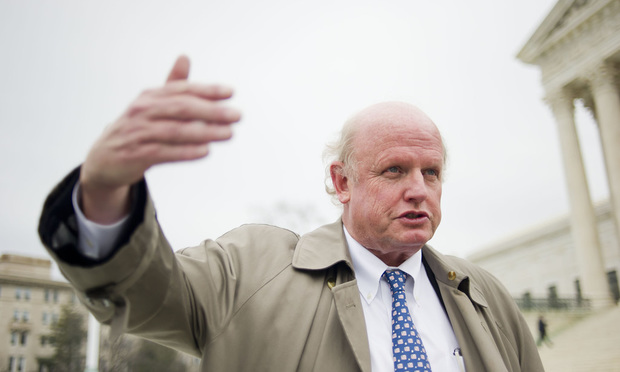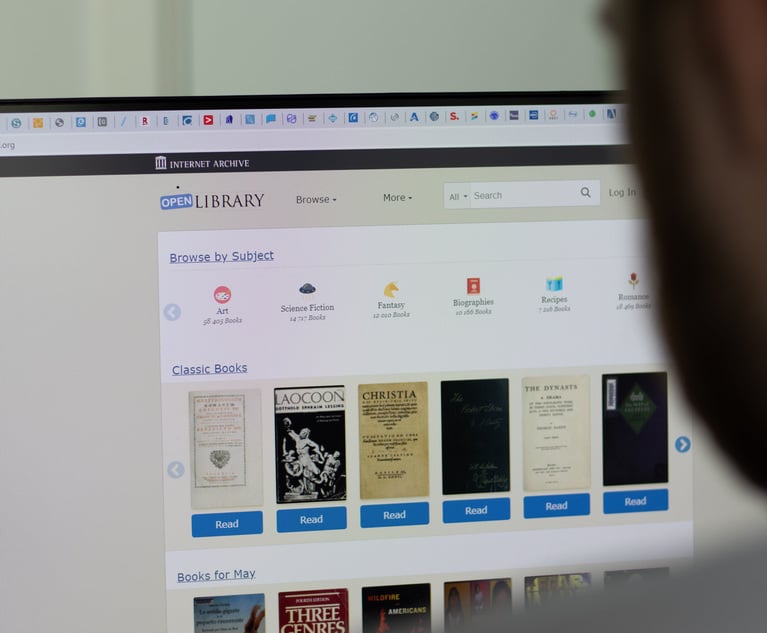Alito Alone Wanted Court to Check Climate Scientist's Defamation Claim
Justice Samuel Alito wrote in his lone dissent: "The core purpose of the constitutional protection of freedom of expression is to ensure that all opinions on such issues have a chance to be heard and considered." Michael Mann's claims can now proceed to a jury.
November 25, 2019 at 11:02 AM
5 minute read
 Justice Samuel Alito Jr. (Photo: Diego M. Radzinschi / ALM)
Justice Samuel Alito Jr. (Photo: Diego M. Radzinschi / ALM)
The U.S. Supreme Court on Monday left undisturbed a District of Columbia appeals court ruling that said the conservative media publication National Review could face a defamation claim over a column that raised questions about climate scientist Michael Mann of Penn State University.
Justice Samuel Alito Jr. wrote a lone dissent, saying the petition, filed by Michael Carvin of Jones Day, "presents questions that go to the very heart of the constitutional guarantee of freedom of speech and freedom of the press: the protection afforded to journalists and others who use harsh language in criticizing opposing advocacy on one of the most important public issues of the day."
Alito wrote in his eight-page dissent: "Climate change has staked a place at the very center of this Nation's public discourse. Politicians, journalists, academics, and ordinary Americans discuss and debate various aspects of climate change daily—its causes, extent, urgency, consequences, and the appropriate policies for addressing it. The core purpose of the constitutional protection of freedom of expression is to ensure that all opinions on such issues have a chance to be heard and considered."
Alito did not go so far as to say the speech in the National Review column "is or is not entitled to First Amendment protection." Mann's case will now be allowed to proceed in the lower courts, and any verdict could return to the Supreme Court for further review.
"But the standard to be applied in a case like this is immensely important," Alito wrote. "Political debate frequently involves claims and counterclaims about the validity of academic studies, and today it is something of an understatement to say that our public discourse is often 'uninhibited, robust, and wide-open.'"
Columnists Rand Simberg and Mark Steyn criticized Mann's "hockey stick" graph showing a slight dip in temperatures between 1050 and 1900 followed by a sharp rise over the last century. They also criticized a Penn State University investigation into wrongdoing by Mann. The two columnists used language such as "misconduct," "manipulation" and "torture" of data in blog posts hosted by National Review Online and the Competitive Enterprise Institute. The institute, represented by Andrew Grossman of Baker & Hostetler, had filed a separate petition for review, which also was denied Monday.
 Michael Carvin after arguing for the plaintiffs in King v. Burwell. March 4, 2015. (Photo: Diego M. Radzinschi / ALM)
Michael Carvin after arguing for the plaintiffs in King v. Burwell. March 4, 2015. (Photo: Diego M. Radzinschi / ALM)Carvin said in his petition that the D.C. Court of Appeals ruling, left to stand, will invite defamation claims on "hot-button political and scientific" disputes.
"For every National Review post that calls one side misleading, there is a Slate column that calls the other side liars. For every Wall Street Journal editorial that calls a liberal a hypocrite, there is a New York Times editorial that calls a conservative a bigot," Carvin wrote. "For every Republican who says that Hillary Clinton committed wrongdoing respecting her emails, there is a Democrat who says that Donald Trump committed misconduct with Russia."
The petition raised two questions: whether a court or jury must decide if a factual connotation is "provably false" and whether the First Amendment permits defamation liability for subjective opinions about a matter of scientific to political controversy. Alito, who wrote that the second question might be "even more important" than the first, said the lower courts had split in answering those questions.
Mann was represented by a team from Cozen O'Connor and the Washington firm Williams Lopatto. John Williams of Williams Lopatto was counsel of record for Mann.
The D.C. Court of Appeals, Mann's lawyers told the justices, "did not abdicate its responsibility to determine whether the defamatory statements were verifiable. To the contrary, it made its own determination (noted eight times in the decision) that the allegations of data manipulation, academic fraud, and scientific fraud were capable of being determined true or false by the jury."
Alito's dissent in National Review v. Mann is posted below:
Read more:
Justice Clarence Thomas Stirs Up a First Amendment Squabble Over Libel Law
Justice Thomas Urges Court to Revisit Landmark Defamation Ruling
Roberts Declares Himself First Amendment's 'Most Aggressive Defender' at SCOTUS
This content has been archived. It is available through our partners, LexisNexis® and Bloomberg Law.
To view this content, please continue to their sites.
Not a Lexis Subscriber?
Subscribe Now
Not a Bloomberg Law Subscriber?
Subscribe Now
NOT FOR REPRINT
© 2025 ALM Global, LLC, All Rights Reserved. Request academic re-use from www.copyright.com. All other uses, submit a request to [email protected]. For more information visit Asset & Logo Licensing.
You Might Like
View All

With Big Law Backing, TikTok Tells DC Circuit Law Forcing Ban or Sale Violates Free Speech

American Bar Association Retracts Israel Statements Following Backlash
Law Firms Mentioned
Trending Stories
- 1Uber Files RICO Suit Against Plaintiff-Side Firms Alleging Fraudulent Injury Claims
- 2The Law Firm Disrupted: Scrutinizing the Elephant More Than the Mouse
- 3Inherent Diminished Value Damages Unavailable to 3rd-Party Claimants, Court Says
- 4Pa. Defense Firm Sued by Client Over Ex-Eagles Player's $43.5M Med Mal Win
- 5Losses Mount at Morris Manning, but Departing Ex-Chair Stays Bullish About His Old Firm's Future
Who Got The Work
J. Brugh Lower of Gibbons has entered an appearance for industrial equipment supplier Devco Corporation in a pending trademark infringement lawsuit. The suit, accusing the defendant of selling knock-off Graco products, was filed Dec. 18 in New Jersey District Court by Rivkin Radler on behalf of Graco Inc. and Graco Minnesota. The case, assigned to U.S. District Judge Zahid N. Quraishi, is 3:24-cv-11294, Graco Inc. et al v. Devco Corporation.
Who Got The Work
Rebecca Maller-Stein and Kent A. Yalowitz of Arnold & Porter Kaye Scholer have entered their appearances for Hanaco Venture Capital and its executives, Lior Prosor and David Frankel, in a pending securities lawsuit. The action, filed on Dec. 24 in New York Southern District Court by Zell, Aron & Co. on behalf of Goldeneye Advisors, accuses the defendants of negligently and fraudulently managing the plaintiff's $1 million investment. The case, assigned to U.S. District Judge Vernon S. Broderick, is 1:24-cv-09918, Goldeneye Advisors, LLC v. Hanaco Venture Capital, Ltd. et al.
Who Got The Work
Attorneys from A&O Shearman has stepped in as defense counsel for Toronto-Dominion Bank and other defendants in a pending securities class action. The suit, filed Dec. 11 in New York Southern District Court by Bleichmar Fonti & Auld, accuses the defendants of concealing the bank's 'pervasive' deficiencies in regards to its compliance with the Bank Secrecy Act and the quality of its anti-money laundering controls. The case, assigned to U.S. District Judge Arun Subramanian, is 1:24-cv-09445, Gonzalez v. The Toronto-Dominion Bank et al.
Who Got The Work
Crown Castle International, a Pennsylvania company providing shared communications infrastructure, has turned to Luke D. Wolf of Gordon Rees Scully Mansukhani to fend off a pending breach-of-contract lawsuit. The court action, filed Nov. 25 in Michigan Eastern District Court by Hooper Hathaway PC on behalf of The Town Residences LLC, accuses Crown Castle of failing to transfer approximately $30,000 in utility payments from T-Mobile in breach of a roof-top lease and assignment agreement. The case, assigned to U.S. District Judge Susan K. Declercq, is 2:24-cv-13131, The Town Residences LLC v. T-Mobile US, Inc. et al.
Who Got The Work
Wilfred P. Coronato and Daniel M. Schwartz of McCarter & English have stepped in as defense counsel to Electrolux Home Products Inc. in a pending product liability lawsuit. The court action, filed Nov. 26 in New York Eastern District Court by Poulos Lopiccolo PC and Nagel Rice LLP on behalf of David Stern, alleges that the defendant's refrigerators’ drawers and shelving repeatedly break and fall apart within months after purchase. The case, assigned to U.S. District Judge Joan M. Azrack, is 2:24-cv-08204, Stern v. Electrolux Home Products, Inc.
Featured Firms
Law Offices of Gary Martin Hays & Associates, P.C.
(470) 294-1674
Law Offices of Mark E. Salomone
(857) 444-6468
Smith & Hassler
(713) 739-1250









